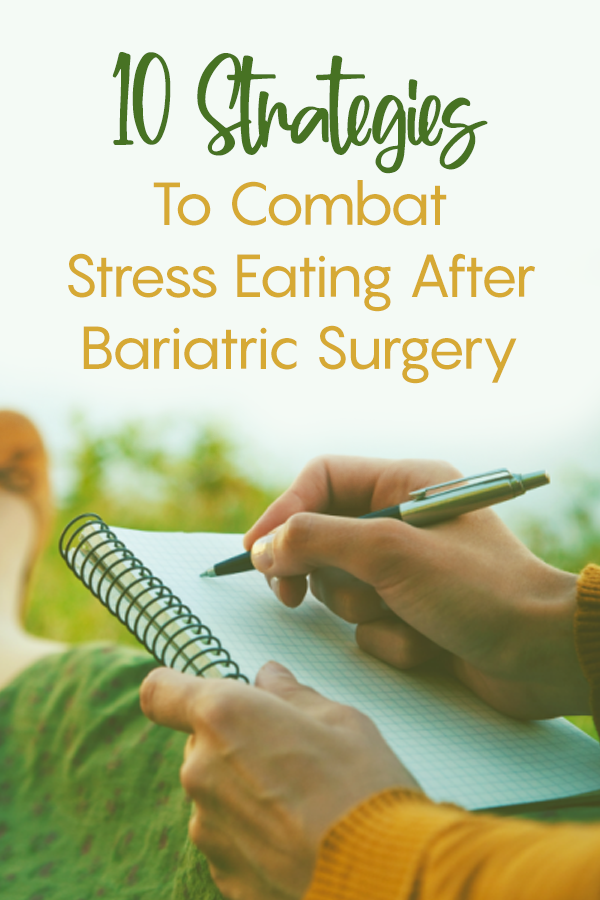
10 Strategies To Combat Stress Eating After Bariatric Surgery
November 17, 2017Stress Eating After Bariatric Surgery - If you’ve ever battled stress-eating, the following scenario might sound familiar:
You’ve worked hard all day to follow your post-weight loss surgery eating and exercise guidelines. You’ve eaten lots of lean protein, gone to the gym, and hit your goal for water intake. You’ve had a good day overall, but then something stressful happens. Perhaps you receive an anxiety-provoking email from someone at work, or you have an upsetting disagreement with a loved one, or you have a particularly challenging bedtime with the kids, or you sit down to pay the bills and realize just how tight your finances are this month.
Stress Eating After Bariatric Surgery
You feel stressed and overwhelmed, and your mind turns to food. You think about those cookies, cupcakes, and chips that are in the house, you know, the ones for your kids’ lunch boxes, for your spouse, or for your roommate. Perhaps your mind turns to the Wendy’s Drive-Thru that is only five minutes away.
You think to yourself, “I shouldn’t eat that….I’ve had a really good day.” but you feel a powerful urge to eat something tasty and comforting. You begin to eat and almost instantly feel soothed and relieved - but also guilty and ashamed.
Although you tell yourself to stop eating several times, you soon find that you’ve eaten to the point of discomfort. Questions like, “Why did I do that?” and “How could I have blown such a good day?” fill your mind. You promise yourself that tomorrow will be a better day and that you will follow your post-surgery guidelines, but you worry that another “stress-eating” episode will derail you.
In our complex and busy world, stress is inevitable. So how can you combat stress-eating episodes and the shame that accompanies them? Here are some strategies to guide you:
Uncover The Root Cause Of Your Stress And Address It
When you’re stressed and ready to start snacking, take one mindful minute to close your eyes, take five deep breaths through your belly, and notice exactly what you’re feeling. I often say that “stress” is not one emotion, but the manifestation of many difficult feelings (sadness, anger, anxiety, loneliness, etc.) hitting at once.
Acknowledge the presence of these feelings and really feel them. We live in a culture that tells us to swallow our feelings, but feeling our feelings fully is the first step to releasing them and beating stress-eating. Let your feelings wash over you completely and remember - they will pass! You might even repeat aloud to yourself, “These feelings will pass. They will pass.”
Next, ask yourself what you truly need, in this moment, to address your feelings. You might need a good cry. You might need to vent your anger through talking to a confidante, yelling, punching a pillow, journaling, or exercising. You might need to do a meditation or conscious relaxation exercise to calm your body and mind. You might need to simply lie down and rest.
We live in an overstimulated and sleep-deprived culture, and exhaustion and stress-eating go hand-in-hand.
At first, it might feel strange to tend to your needs. In my work with weight loss surgery patients, I have found that they almost always put others’ needs ahead of their own. Please remember - your needs are legitimate and truly matter - and taking care of yourself benefits both you and those that you care about!
Through this process of identifying your feelings, feeling them fully, and addressing your true needs, you’re getting to the root causes of your stress. This allows you to truly self-soothe rather than numbing your stress with food.
Change Your Environment
Not surprisingly, stress-eating is often triggered by a stressor in your immediate environment. For example, your stress might be driven by tension at home between you and your roommate, the feeling of ‘I don’t want to be here” at a social gathering, or your co-worker driving you crazy. It can be helpful to recognize these triggers and, if possible, change your environment when you feel a stress-eating episode coming on.
Take a walk or drive, move to a different room of your house or apartment (preferably not the kitchen!), tactfully leave the social gathering that is stressing you out, or simply go outside for some fresh air and a change of scenery. By removing yourself from the stressful environmental trigger, you’re positioning yourself to make thoughtful, non-reactive eating choices.
Preemptively Create A Coping List For When You’re Stressed
I recognize that the first two strategies are not always feasible. Sometimes you’re not in a position to “soul search,” and other times it’s simply not feasible to change your environment. In these cases, it’s valuable to have a few quick strategies on-hand to shift your focus away from stress-eating. Therefore, I encourage you to preemptively create a list of coping strategies to utilize when you feel a stress-eating episode coming on.
Below are ten science-backed strategies to guide you. These strategies have been found to calm the sympathetic nervous system (“fight, flight, or freeze response associated with stress) and engage the parasympathetic nervous system (the “rest and digest” response associated with relaxation). When your body and mind are relaxed, you’re much better equipped to avoid stress-eating.
10 Strategies To Cope With Stress Eating After Bariatric Surgery
- Try progressive muscle relaxation (PMR). This is an exercise in which you slowly tense and relaxes all of your muscle groups including your feet, legs, abdomen, arms, hands, shoulders, and face. When the body relaxes, the mind soon follows. Many free PMR exercises can be found online.
- Watch a comedy. It isn’t just fun to laugh - it also reduces stress! Add some great comedies to your Amazon or Netflix watch lists, or have a stack of your favorite DVDs at the ready.
- Create art or do a craft project. Make a trip to a craft store so that your supplies are stocked and ready to use.
- Breathe deeply. Breathe deeply through your belly for five minutes.
- Try a guided imagery exercise.Give your mind a break by visualizing yourself having a peaceful experience. Many free imagery exercises can be found online.
- Take a nap. Make it a comfy one!
- Write in a journal. Give yourself some time in reflection, and in particular, write about what you’re grateful for. Gratitude is associated with reduced stress and enhanced well-being.
- Take a walk in nature. Take your time and really experience the outdoors with all of your senses.
- Turn on some music. Have soothing playlists ready to go on Spotify, or break out your favorite CDs.
- Try aromatherapy. Certain scents, including lavender and lemon, relieve stress and lower heart rate. Pair aromatherapy with any of the strategies above for a truly stress-relieving experience. Be prepared for stressful moments with candles, sachets, and essential oils.
Which of these strategies might work for you? Can you think of others?
Take a few moments to create your own list of stress-relief strategies and keep copies in easily accessible places, such as in your purse or briefcase, on the fridge, and in the console of your car. Just as you have protein snacks prepared for when physiological hunger hits, you can have self-care strategies ready for when stress-related “hunger” strikes as well.
Our complex, busy lives are full of stressful moments, but stress eating doesn’t have to be your response. Using the strategies above, you can respond to life’s stressors with self-care, nurturing, and empowerment. With a bit of mindfulness and preparation, you can emerge victorious from the stress-eating battle!

 | ABOUT THE AUTHOR Tanie Miller Kabala, Ph.D. is a licensed clinical psychologist and integrative wellness coach who specializes in treating weight loss surgery patients. She wrote her book, The Weight Loss Surgery Coping Companion: A Practical Guide to Coping with Post-Surgery Emotions to help patients navigate the emotional journey of weight loss surgery. Read more articles by Tanie! |



